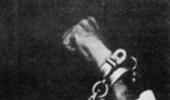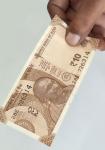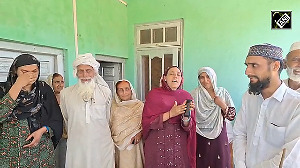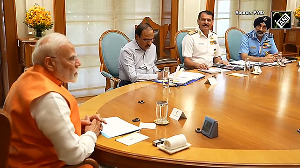'George Fernandes will always be remembered in history as the man who successfully called the railway strike.'

George Fernandes, who passed into the ages on Tuesday, January 29, was a fierce Socialist and one of the most prominent leaders who battled the Emergency imposed by then prime minister Indira Gandhi between June 1975 and March 1977.
He was responsible for calling the 20-day railway strike in 1974 that brought the nation to its knees.
Nearly 45 years after he called the strike, which went down in history as the largest recorded industrial action in the world, Rakhal Das Gupta, president of the All India Railwaymen's Federation, remembers about the firebrand leader and his passion to fight for the rights of the poor and the working class.
"The 1974 strike, contrary to popular belief, was not a sudden action. It was preceded by strikes by rail workers across the country in 1967, 1968, 1970 and 1973. However, in 1973 the government led by Indira Gandhi bought themselves some time and postponed the strike.
In April 1974, Fernandes was in negotiations, demanding eight hour working days and a raise in their pay scale, with Mohammed Shafi Qureshi, then the minister of railways. It was decided that he would be holding a meeting with Qureshi on April 30, 1974, which was later pushed to May 1 -- Labour Day. Coincidentally, Fernandes was to address a meeting in Lucknow on the same day.
However, in the midnight hours of May 1, Fernandes was arrested by the police and flown to Tihar jail. The government wanted to scuttle the negotiations as Indira Gandhi wanted to prove her might. She had become too powerful after winning the 1971 War and wanted to bulldoze every opposition.
Fernandes, along with many other railway leaders, was arrested. It was amid this action that the historic railway strike of 1974 was called.
This strike continued for 20 days. There was not a single train running in the country. Everything just came to a grinding halt.
It was only after the government took very harsh, repressive, measures that the trains ran again. Indira Gandhi sacked over 40,000 railway men from their jobs.
India had become like a jail. In railway colonies, people, who were participating in the union, were either transferred to remote postings or thrown into jail.
Before his arrest, I had travelled with George Fernandes. He was such a popular leader then. A firebrand union leader, who was an excellent orator. No one came close to him in terms of popularity.
When Indira called off the Emergency and issued an order for fresh elections, Fernandes contested from Bihar's Muzaffarpur and won with a thumping majority.
In 1977, he became the industries minister in the Janata Party government and once again shot to the limelight when he told Coca-Cola to wind up its operations in the country because the Janata Party's philosophy was to promote Indian companies.
During the Railway Budget in 1977, the Janata Party government took back all the sacked railway employees. The railway workers, who were transferred to remote locations, were sent back to their original postings.
In the later stages of his political life, Fernandes became close to the BJP (Bharatiya Janata Party) and then joined the NDA (National Democratic Alliance). It was around this time that we lost touch with each other. I have another political thought; I never wanted him to join the NDA.
George Fernandes will always be remembered in history as the man who successfully called the railway strike.
Rakhal Das Gupta spoke to Syed Firdaus Ashraf/Rediff.com












 © 2025
© 2025